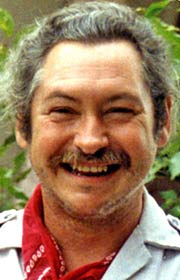BERTELL "BERT" D. DAVIS / 1942-2005
Archaeologist pioneered
work on Hawaiian sites
Archaeologist Bertell "Bert" D. Davis, 62, whose fieldwork contributed significantly to knowledge and preservation of Hawaiian archaeological sites, died Jan. 16.
![]()

![]()
Bertell Davis: The researcher is best known for his work on Barbers Point from the 1970s
"He was a real hard case for doing extremely detailed professional work in the contract archaeological field -- often to the exasperation of employers, because he would insist that further work would have to be done and often run them over budget," said Bion Griffin, interim associate dean of the UH anthropology department.
Davis came to Hawaii around 1965 in the Army, Griffin said. He applied to go to Vietnam, and the Army wouldn't send him so he went as soon as he was discharged.
Davis began doing archaeology in Hawaii in the early 1970s with various projects at Barbers Point, and is best known for his work there, said Griffin, who was chair of Davis' doctoral dissertation.
Davis taught archaeology field schools for UH and participated in many projects for the university, Bishop Museum, Archaeological Research Center Hawaii and International Archaeological Research Institute, Inc.
He worked for seven or eight years as a civilian archaeologist on missions for the Army Central Identification Lab, Griffin said.
In the last three years, he worked on an archaeological site survey along the Mekong River in Cambodia with Griffin and Mike Dega, senior archaeologist at Scientific Consultants Services.
"He saw that as sort of a legacy," Griffin said. "It was a return to his first love, Southeast Asian archaeology."
He ran field trips in archaeologically unknown areas along the Mekong and "did a great job" training Khmer Cambodian archaeology students, Dega said. "The students miss him."
Dega said Davis worked on more than 300 archaeology projects. "He was a real technician in the field. He was one of the most dedicated archaeologists I ever met and worked with."
"Bert was meticulous in his field notes and his fieldwork," said Earl "Buddy" Neller, of Ellensburg, Wash., formerly with the state Historic Preservation Office and Office of Hawaiian Affairs.
"Because of his strong desire to do good work and a commitment to preserve as much of the archaeological record as possible, he worked long hours."
Neller said he often found Davis working alone on weekends, digging in the kiawe forest jungle of Barbers Point.
Because of his extensive excavations, Neller said, "We have a much better idea of what to expect archaeologically at such sites and about the range of variability in Hawaiian religious worship. This is one of Bert's greatest contributions."
Griffin said Davis encouraged Cambodia to develop a national register of archaeological sites. "He was extremely committed to helping the Khmer Cambodian people rebuild their archaeological programs and professional skills following catastrophes of three decades of war."
Davis' survivors include his wife, Kwan Jai of Thailand, and son Eric of Honolulu.
Vietnamese Buddhist services were held Wednesday at Oahu Cemetery Chapel by Ultimate Cremation Services of Hawaii.
[News] [Business] [Features] [Sports] [Editorial] [Do It Electric!]
[Classified Ads] [Search] [Subscribe] [Info] [Letter to Editor]
[Feedback]
